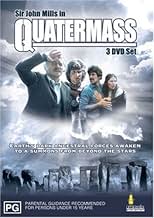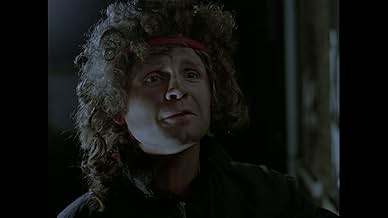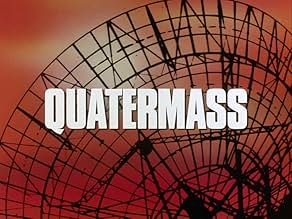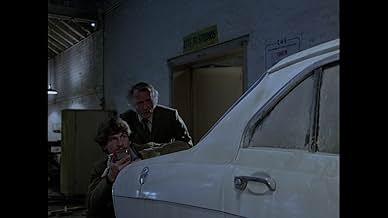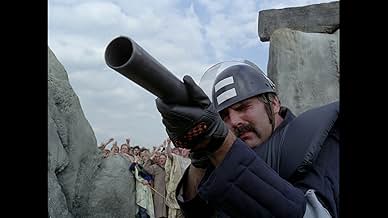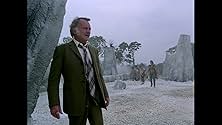In the distant future, a now-elderly Bernard Quatermass investigates the disappearance of his granddaughter and a mysterious cult.In the distant future, a now-elderly Bernard Quatermass investigates the disappearance of his granddaughter and a mysterious cult.In the distant future, a now-elderly Bernard Quatermass investigates the disappearance of his granddaughter and a mysterious cult.
Browse episodes
Featured reviews
I recently watched the complete four-hour version of Nigel Kneale's British miniseries "Quatermass." I had seen an edited movie version called "The Quatermass Conclusion" some years earlier. The verdict: The miniseries is superior. It expands on several subplots (of course) and offers richer characterizations. John Mills makes an excellent Quatermass--somewhat befuddled at the outset, but strong and clear of mind when the survival of the world is at stake. Granted, the production is not as polished as the movie version of "Quatermass and the Pit" (the music, in particular, sounds like it costs a couple of hundred bucks). But the ideas are intriguing and that darn nursery rhyme about Ringstone Round is still running around my brain. Kneale wrote a novelization of the miniseries that clarifies a few vague points.
I remember seeing this broadcast. It was made by Euston Films so I was expecting th usual "Sweeney" type over-grain in the picture (1970's high speed 16mm), but instead it had the full gorgeous look of a motion picture, having been shot in 35mm with full motion picture negative (whereas most American productions were shot on 35mm television stock). The special effects where not all that good where the space shots were concerned - even by 1970's standards (to see good examples of these effects look at Space 1999 (1976 - 1978) whose Director of Effects, Brian Johnson, went on to win an Oscar just a couple of years later - for Alien). But the idea that a beam would come through space and consume vast number of people and turn them into a diaphanous web was effectively executed. It would be nice to see it again in its full version - perhaps the BBC could show it without breaks in two parts. Also it was an early appearance for Simon McQuorkindale (Manimal!).
The Quatermass Conclusion deals with an alien machine returning to the Earth after five thousand years to 'harvest' and stir-up the glandular secretions of humans which it then uses for it's own ends. Set in a near-future (in the 70s when it was released), the scene is an anarchistic, broken-down and violent vision of Britain, but none of the little touches are over the top enough to be classed as impossible. Prince Charles is on the throne, cars have number plates with 'v' on them and the Metropolitain Police are now privately contracted. Street crime, muggings and overall disorder are all the people know (oh no, it's all coming true!!) When the alien presence is identified as a threat rather than a religious saviour in a chilling Nigel Kneale trademark 'revelation of terror': the body parts in the ashes at Ringstone Round, Quatermass is employed in his quite usual role of leading science against politicians and the military machine to engage the menace. This seems to perk him up a little, when we see him first he is an old man broken down by the anarchy of society, depressed also that his work with the rocket group ended up being misused only for military ends. This is a very bleak piece which would depress viewers if it wasn't so busy chilling and terrifying the hell out if them with trademark Nigel Kneale 'terror revelations' and extremely succinct scientific concepts and valid predictions. Not only that, but it lays claim to having the most chilling and atmospherically terrifying aspect of all of the Quatermass films and serials, the spine-tingling refrain of 'huffity-puffity Ringstone Round'. I always only ever thought there were three Quatermass serials, Xperiment, II and Pit, up until about 4 years ago, when a conversation in a pub about there being another where 'people were being drawn to Stonehenge to be eaten' put me on the trail of this, and the first time I managed to get to see it after this revelation my blood ran cold at that nursery rhyme. I had a shudder just then recalling it.
"The Quatermass Conclusion" is one of the few 'true' pieces of science fiction ever committed to film and Nigel Neale's script rates up there with "2001" and "Dark Star" for inventiveness. Unfortunately it suffered from an obviously low budget and there are lapses here and there into melodrama. The story, set in a dystopian Britain, concerns the arrival of an unknown alien force which is 'harvesting' the youth by leading them to ancient ritual sites. Professor Quatermass (John Mills) comes out of retirement to look for his missing granddaughter and is drawn into the fight to save the planet's population. There are some disturbing images such as Wembley Stadium reduced to a 'killing ground' and the pensioners forced to live underground for safety. Many of the predictions in the film have since come about, such as the upsurge in 'hippy travellers' and the general social decay of the inner cities.
This was Nigel Kneale's fourth and final Quatermass TV serial. The first three were also adapted into very good movies, this one wasn't, but it was edited down into a film, usually known as "The Quatermass Conclusion". I say avoid that and try and see this the full version, which goes for around 200 minutes. John Mills' Quatermass is very different from Andrew Keir's, Andre Morell's and most especially Brian Donlevy's Quatermass. Mills plays him as a tired and out of touch old man. The plot is set in the near future. Society has broken down, youth gangs roam the streets, while others known as "the planet people" wander the countryside. They are anti-science, anti-"progress" hippies who believe that they will one day be taken up and sent to another planet. I see some people criticise the planet people as being "out of date". These people seem to be unaware of the travellers/"crusties" phenomenon in Britain in the 1980s, and what about the "Heaven's Gate" cult of more recent years? Quatermass' granddaughter has run away from home, and while he searches for her he becomes involved with the planet people, a group of which seemingly are "taken" while congregating around some ancient standing stones. But this is only the beginning... to give away more of the plot would be a shame. The budget for this mini-series is obviously not all that large, and the special effects are modest, but they are generally pretty effective, the acting is good for the most part, and it contains an intelligence and darkness rarely seen in contemporary TV SF. 'Quatermass' has a few flaws but I think it is extremely underrated and a fine close to Kneale's Quatermass series.
Did you know
- TriviaStarted life in 1973 as a BBC series called "Quatermass IV". It had been commissioned by Head of Drama Ronald Marsh, and according to Nigel Kneale, the intended producer was Joe Waters. Some model test sequences of the space station were shot, but eventually, the project was abandoned by the BBC. ITV then picked it up a few years later and produced it in association with Euston Films.
- Alternate versionsThis has been made available in the United States in two versions. It was first released edited down to a 105 minute feature film under the title The Quatermass Conclusion (1979). In 2003 the complete program was released on home video under the title "Quatermass" with a listed running time of 240 minutes.
- ConnectionsEdited into The Quatermass Conclusion (1979)
- How many seasons does Quatermass have?Powered by Alexa
Details
Contribute to this page
Suggest an edit or add missing content

